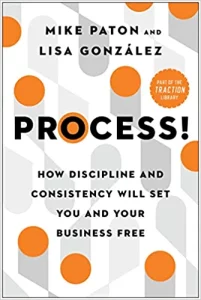Chapter 1 – The Right Mindset, page 1.
- “Magic happens when you blend a culture of discipline with an ethic of entrepreneurship” – Jim Collins
- Nearly every story of entrepreneurship begins with a passion that fuels the founder, the people, and the culture.
- Every organization eventually reaches a point where passion isn’t enough.
- When the entrepreneur feels stuck, their first thought is often to hire someone. But they quickly realize that hiring, training, and managing even one person requires a lot of precious time and can be exhausting.
- Still feeling stuck, the entrepreneur is now exhausted, and their passion begins to fade.
- This is what Larry E. Greiner refers to as “Hitting the Ceiling” in his article titled, “Evolution and Revolution as Organizations’ Grow.“
- This book presents a simple and proven solution to a problem faced by nearly all fast-growing companies: inconsistent execution.

- Entrepreneurs need freedom, variety, and flexibility; all of which seem to be the antithesis of Processes and Systems. And this is what the author refers to as the “Paradox of Process.”
- Getting a handful of core processes documented, simplified, and followed by all will create freedom, not destroy it.
Three Anti-Process Myths of an Entrepreneur
Myth 1: Process is not in my nature
- Most entrepreneurs are creators, disruptors, and challengers of the status quo.
- The very idea of doing something the same way over and over again seems intolerable.
- However, the actions that create consistently exceptional results are not at all obvious to most people in a growing business. Letting employees figure it out for themselves is inefficient and costly.
Myth 2: Processes take too much time
- The most common issue for entrepreneurs and their leadership team is “Capacity.” There is never enough time for working in the business, let alone working on the business.
- However, as the great John Wooden said, “If you don’t have time to do it right, when will you have time to do it over?”
- Most entrepreneurs underestimate the time wasted due to inefficient processes and overestimate the time it takes to create and/or strengthen core processes.
Myth 3: Process destroys freedom
- Many leaders fear the loss of innovation, creativity, and flexibility.
- As Jim Collins describes in Good to Great, ” The purpose of bureaucracy is to compensate for incompetence and lack of discipline. Most companies build their bureaucratic rules to manage the small percentage of wrong people on the bus, which in turn drives away the right people, which increases the percentage of wrong people, which increases the need for more bureaucracy.”
- However, this begins to paint a false dichotomy, a logical exercise used by debaters (and con artists) to convince people that only two options exist.
- Establishing a culture of discipline, which Jim Collins defines as “disciplined people who engage in disciplined thought and take disciplined action-operating with freedom within a framework of responsibilities-this is the cornerstone of a culture that creates greatness.



